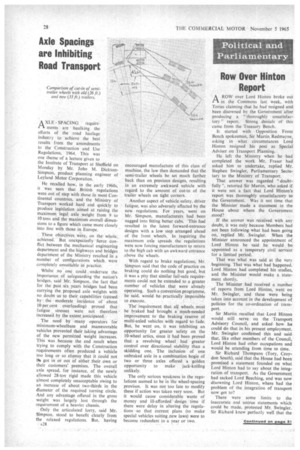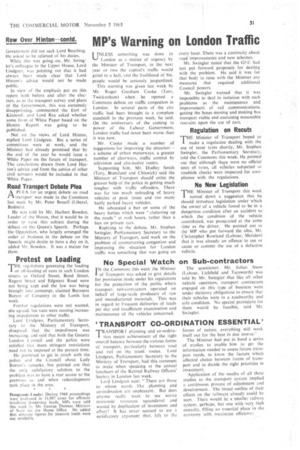Row Over Hinton Report
Page 30

Page 33

If you've noticed an error in this article please click here to report it so we can fix it.
A ROW over Lord Hinton broke out IA in the Commons last week, with
Tories claiming that he had resigned and been disowned by the Government after producing a "thoroughly unsatisfactory report. Strong denials of this came from the Treasury Bench.
It started with Opposition Front Bench spokesman, Sir Martin, Red mayne, asking in what circumstances Lord Hinton resigned his post as Special Adviser on Transport Planning.
He left the Ministry when he had completed the work Mr. Fraser had asked him to undertake, replied Mr. Stephen Swingler, Parliamentary Secretary to the Ministry of Transport.
That answer was regarded "doubtfully ", retorted Sir Martin, who asked if it were not a fact that Lord Hinton's report was thoroughly unsatisfactory to the Government Was it not time that the Minister made a statement in the House about where the Government stood?
If the answer was received with any doubt, it was only because Members had not been following what had been going on, replied Mr. Swingler. When the Minister announced the appointment of Lord Hinton he said he would be appointed as a temporary civil servant for a limited period.
• That was what was said at the very beginning. That was what had happened. Lord Hinton had completed his studies, and the Minister would make a statement shortly.
The Minister had received a number of reports from Lord Hinton, went on Mr. Swingler, and these were being taken into account in the development of policies for the co-ordination of transport.
Sir Martin recalled that Lord Hinton would still serve on the Transport Advisory Council, and asked how he could do that in his present employment. Mr. Swingler confirmed this and said that, like other members of the Council, Lord Hinton had other occupations and would be attending from time to time.
Sir Richard Thompson (Tory, Croydon South), said that the House had been promised a statement founded on what
Lord Hinton had to say about the integration,of transport. As the :Government
had sacked Lord Beeching, and was now disowning Lord Hinton, where had the problem of the integration of transport now got to?
There were some limits to the inaccurate and untrue statements which could be made, protested Mr. Swingler. Sir Richard knew perfectly well that the Government did not sack Lord Beeching. He asked to be relieved of his duties.
While this was going on, Mr. Swingler's colleague in the Upper House, Lord Lindgren, was pointing out that it had always been made clear that Lord Hinton's advice would not be made public.
In view of the emphasis put on this report both before and after the election, as to the transport survey and plans of the Government, this was extremely • disappointing, commented the Earl of Kinnoull, and Lord Rea asked whether some form of White Paper based on the Hinton Report was going to be published.
Not on the views of Lord Hinton, replied Lord Lindgren. But a series of committees were at work, and the Minister had already promised that by the end or the year he would issue a White Paper on the future of transport. • The conclusions drawn from Lord Hinton's advice and from the advice of other civil servants would be included in that White Paper.
Road Transport Debate Plea
:A
A Pl.EA rm. an urgent debate on road transport was made in the Commons last week by Mr. Peter Bessell (Liberal, Bodmin).
He was told by Mr. Herbert Bowden, Leader of the House, that it would be in order to raise this subject during the debate on the Queen's Speech.. Perhaps the Opposition, who largely arranged the order of business in the debate on the Speech. might desire to have a day on it, added Mr. Bowden. It was a .matter for them.
Protest on Loading
THE regulations governing the loading or off-loading of vans in such London streets as Oxford Street, Bond Street, Regent Street and Edgware Road were not being kept and the law was being brought into contempt, claimed Baroness Burton of Coventry in the Lords last week.
Further regulations were not wanted, she agreed, but vans were causing increasing impediment to other traffic.
Lord Lindgren, Parliamentary Secretary to the Ministry of Transport, disagreed that the impediment was increasing, and said that both the Greater London Council and the police were satisfied that more stringent restrictions :need not be imposed at the present time.
He promised to get in touch with the police and the Council about Lady Burton's remarks, but pointed out that the only satisfactory solution to the problem was to have a rear access to the premises as and when redevelopment took place in the area.
Dangerous Loads: During 1964 proceedings were instituted in 11,087 cases for offences involving dangerous loads, MPs were told this week h, Mr. George Thomas. Minister of Stale for the Home Office. He added that separate figures for insecure loads were not available.




















































































































